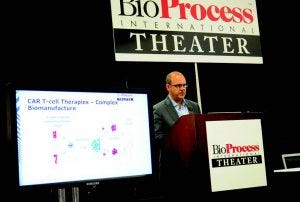- Manufacturing
- Sponsored Content
Manufacturing for Chimeric Antigen Receptor (CAR) T-Cell and Gene TherapiesManufacturing for Chimeric Antigen Receptor (CAR) T-Cell and Gene Therapies
August 11, 2016
Sponsored by Cobra Biologics
Daniel Smith (chief scientific officer, Cobra Biologics) BPI Theater @ BIO, June 7, 2016, 1:40–2:00 pm
Cobra Biologics has been active in gene therapies for 20 years. The company began by manufacturing plasmid DNA for use in gene therapy products. It rapidly moved into contract manufacturing and now has a broad offering of protein virus DNA, fill–finish services, wholesale vaccines, and biologics. Based in Europe, Cobra has a facility in the United Kingdom specializing in microbial plasmid production and viral vectors for gene therapy. In Sweden, one facility focuses on mammalian antibody production and another performs large-scale microbial production with fill–finish capacity.
Recently Novartis announced 100% remission in a clinical trial using chimeric antigen receptor T (CAR-T) cells. The first such trial was performed in 2011, and it demonstrated that CAR-T-cells can treat patients with late-stage disease. Multiple trials are now under way in oncologic applications all over the world.
Cobra focuses on plasmid DNA right from the start and offers a number of options. Customers have a choice in phase-appropriate plasmid manufacturing. The plasmid recovery and purification steps share a common platform.
CAR-T therapies involve a complex manufacturing supply chain, and they require rapid and flexible access to critical GMP-grade starting materials. Cobra can provide quality plasmid DNA for producing CAR-T cells in just seven weeks so its clients can move rapidly into clinical testing.
You May Also Like






